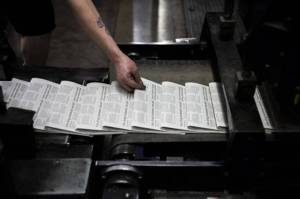How ego, greed helped drive this crisis
Published 10:58 am Wednesday, October 29, 2008
WASHINGTON — The hedge fund industry coined a term several years ago for the idea that special people (i.e., hedge fund managers) could achieve above-average returns without taking commensurate risk. They called this investment nirvana “alpha,” to distinguish it from the “beta” of average market returns available to ordinary investors who tracked, say, the S&P 500.
It was the ultimate elitist investment philosophy. The premise was that alpha managers were more clever than other people, and could therefore outperform the market. They could do the things that normal investors were cautioned against — time the markets’ ups and downs, engage in speculative short selling, borrow heavily to increase their returns. These smarter-than-average managers offered their services to richer-than-average investors who could afford the hedge funds’ hefty fees.
This idea of special investment opportunities for the very rich created a kind of cult. Institutional Investor in 2003 began publishing Alpha magazine for the hedge fund mavens. In a taunt to the poor clods of the beta world, the magazine compiled an annual survey of what the leading fund managers were making. The average compensation for the top 25 managers last year was a jaw-dropping $892 million, up from $532 million in 2006. Five managers “earned” (if that’s the right word) more than $1 billion each.
As the bubble economy expanded, the alpha managers became ever more confident of their ability to defy the fundamentals of the beta marketplace. They began speaking of “portable alpha,” which purported to remove market risk entirely from a portfolio by using futures, swaps, options and short selling. They were claiming, in effect, to have discovered the equivalent of a gravity-free world, an eternal banquet of free lunches.
The idea that you could use financial engineering to achieve high returns on capital with low risk became contagious. It wasn’t enough to grow with the underlying economy and prosper along with everyone else. Banks and other financial institutions began seeking their own versions of alpha through strategies that sought to beat the averages. A favorite method was pooling traditional, plain-vanilla assets, such as mortgage loans, and turning them into tradable securities.
The players wanted their own slices of alpha: Smarter-than-average bankers could make big fees on securitization; smarter-than-average executives at Fannie Mae could harvest big bonuses. The seduction was the idea that the risk inherent in individual loans — that pesky beta — would somehow drop out of the equation if the pool was big enough and the paper sold widely enough. Bankers began to talk as if market risk was a dial you could calibrate up or down, to fit your desired level of return.
That make-believe world began to crash in August 2007. Suddenly, there was no market for the paper assets that had been created out of pools of mortgages — because in a falling market, nobody knew what they were worth. All the smarter-than-average people who had been chasing better-than-average returns began to be frightened. And over the past year, that fear became toxic. It sucked the trust and confidence out of markets; it was like trying to breathe on a planet with no oxygen.
And then the panic: That has been the most unattractive part of this story. The greed side of the alpha world was bad enough, with its $100 million homes and private art galleries. But the fear side has been more destructive. What’s driving the severe financial downturn now is the quest for “alpha security” among the richest and most powerful. Having made their loot, the very rich are desperate to protect it. So “smart money” has been sitting on its cash — shunning any institution that might be contaminated, even a mighty Lehman Brothers — and refusing to lend for longer than 24 hours.
“Not since the beginning of the First World War has our banking system been so close to collapse,” warned Mervyn King, the governor of the Bank of England, in a recent speech. King, who helped devise the plan for recapitalization of banks that has now been embraced globally, is one of the few heroes in this crisis.
It’s not a pretty sight: People in the financial world tell me about friends who are buying safes in which to store their cash at home; about withdrawals of millions of dollars in currency to prepare for the ultimate meltdown. Now the alpha spirit comes back as hoarding, but with the same premise: I’m special. The rest of the world be damned.
David Ignatius is a Washington Post columnist. His e-mail address is davidignatius@washpost.com.


